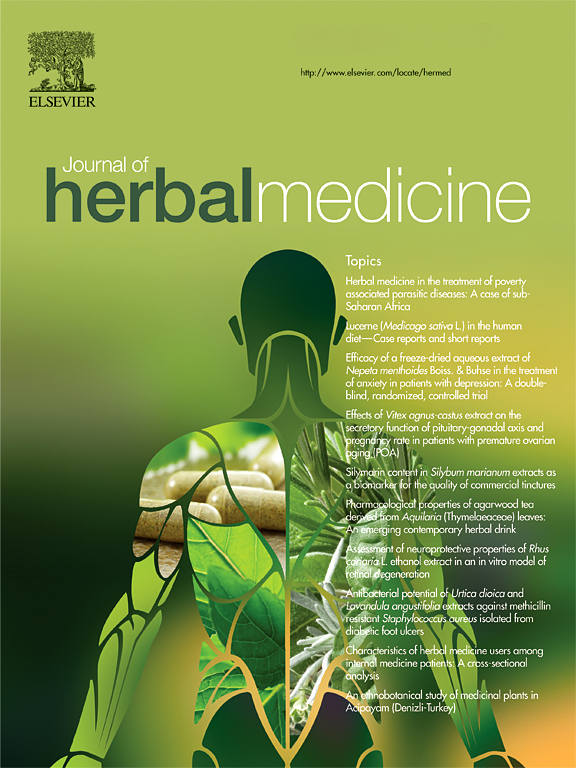Xiaoyou decoction promotes apoptosis and alters inflammatory factor levels in cervical precancerous cells by inhibiting the PI3K/AKT/NF-κB signalling pathway
IF 1.9
4区 医学
Q2 INTEGRATIVE & COMPLEMENTARY MEDICINE
引用次数: 0
Abstract
Objectives
To investigate the underlying mechanism of Xiaoyou decoction (XYD) in inducing apoptosis and modulating the inflammatory response in human immortalised cervical epithelial H8 cells through the phosphatidylinositol 3-kinase (PI3K)/protein kinase B (AKT)/Nf-kappaB (NF-κB) signalling pathway.
Methods
H8 cells in logarithmic growth phase were treated with blank medium, recombinant human interferon α-2b (13 000 IU/mL), oxymatrine (4.80 mg/mL), and XYD (2.80 mg/mL) for 48 hours. Subsequently, cell counting kit-8 assay, flow cytometry apoptosis assay, acridine orange hydrochloride and Hoechst double staining, western blot, and Quantitative Real-time-PCR were performed to assess apoptosis, inflammation, and key pathway-related indices in each group.
Results
In vitro experiments revealed that all treatments, including XYD and the control groups, exerted some degree of growth inhibition on H8 cells. However, XYD displayed the most significant inhibitory effect. Western blot and Quantitative Real-time-PCR analyses confirmed that XYD promoted apoptosis in H8 cells by suppressing the activation of the PI3K/AKT signalling pathway. Furthermore, it modulated the levels of inflammatory and immune-related factors in H8 cells by inhibiting the activation of the NF-κB signalling pathway.
Conclusions
This study validates the molecular mechanism of XYD in promoting apoptosis and suppressing the inflammatory response in H8 cells by inhibiting the activation of the PI3K/AKT/NF-κB signalling pathway.
消油汤通过抑制PI3K/AKT/NF-κB信号通路促进宫颈癌前细胞凋亡,改变炎性因子水平
目的探讨消油汤通过磷脂酰肌醇3-激酶(PI3K)/蛋白激酶B (AKT)/ NF-κB (NF-κB)信号通路诱导人颈上皮H8细胞凋亡和调节炎症反应的机制。方法采用空白培养基、重组人干扰素α-2b(13000 IU/mL)、氧化苦参碱(4.80 mg/mL)、XYD(2.80 mg/mL)处理对数生长期sh8细胞48 h。随后采用细胞计数试剂盒-8、流式细胞术细胞凋亡、盐酸吖啶橙和Hoechst双染、western blot、定量Real-time-PCR检测各组细胞凋亡、炎症及关键通路相关指标。结果体外实验显示,XYD和对照组对H8细胞均有不同程度的生长抑制作用。其中,XYD的抑制作用最为显著。Western blot和Quantitative Real-time-PCR分析证实,XYD通过抑制PI3K/AKT信号通路的激活,促进H8细胞凋亡。此外,它通过抑制NF-κB信号通路的激活来调节H8细胞中炎症和免疫相关因子的水平。结论本研究验证了XYD通过抑制PI3K/AKT/NF-κB信号通路激活促进H8细胞凋亡、抑制炎症反应的分子机制。
本文章由计算机程序翻译,如有差异,请以英文原文为准。
求助全文
约1分钟内获得全文
求助全文
来源期刊

Journal of Herbal Medicine
INTEGRATIVE & COMPLEMENTARY MEDICINE-
CiteScore
3.90
自引率
0.00%
发文量
94
期刊介绍:
The Journal of Herbal Medicine, the official journal of the National Institute of Medical Herbalists, is a peer reviewed journal which aims to serve its readers as an authoritative resource on the profession and practice of herbal medicine. The content areas of the journal reflect the interests of Medical Herbalists and other health professionals interested in the clinical and professional application of botanical medicines. The objective is to strengthen the research and educational base of herbal medicine with research papers in the form of case studies, original research articles and reviews, monographs, clinical trials and relevant in vitro studies. It also publishes policy statements, opinion pieces, book reviews, conference proceedings and profession related information such as pharmacovigilance reports providing an information source for not only the Herbal Practitioner but any Health professional with an interest in phytotherapy.
 求助内容:
求助内容: 应助结果提醒方式:
应助结果提醒方式:


